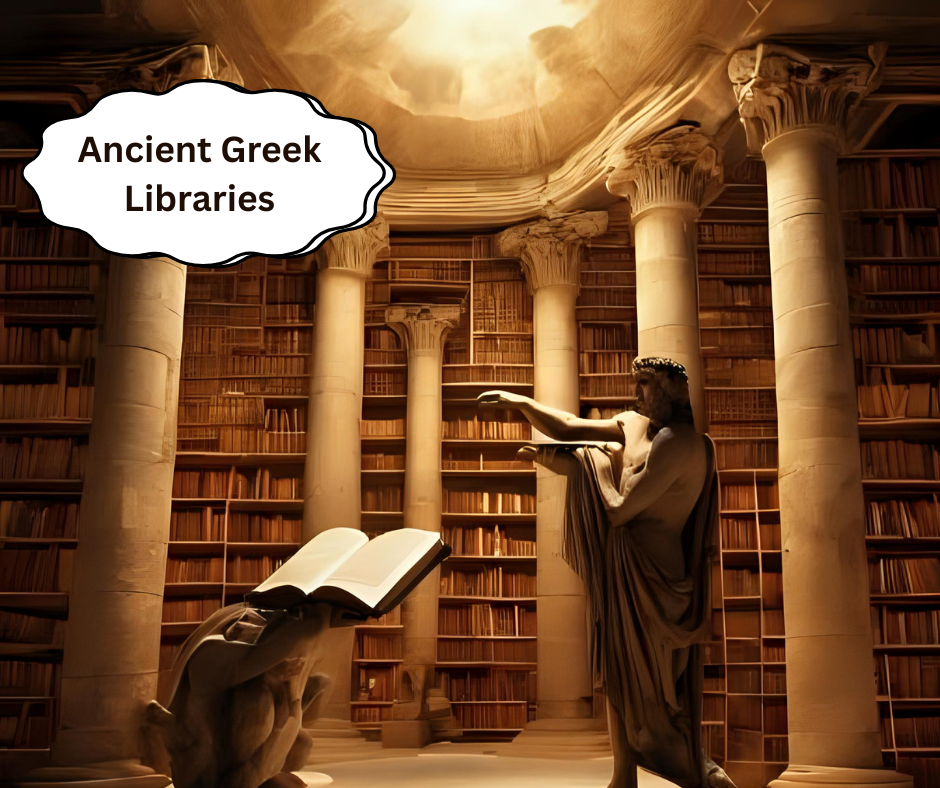Greek civilization will forever be remembered for its lasting contributions to humanity. From philosophy and politics to mathematics and literature, the Greeks laid the foundation for much of modern thought. Among these achievements, the development and preservation of books stand out as one of the most enduring. The Greek approach to book collecting and library building ensured that the intellectual heritage of Greece was not lost, but rather transmitted across centuries.
Unlike modern times where we think of a library as a single building with shelves, the “Greek library” was never just one institution. Instead, it was a collection of many public and private libraries scattered across Greece, each holding fragments of the civilization’s wisdom. These libraries preserved a wide range of subjects: history, philosophy, religion, mathematics, politics, drama, and science. Without them, much of what we know today about Greek thought and literature might have been forgotten.
In ancient Greece, writing was done on a variety of materials: parchment, vellum, papyrus rolls, and wax tablets. Each had its own role—papyrus rolls were often used for literary works, while wax tablets served for everyday notes and drafts. These materials were carefully stored and preserved in the libraries of Greece, which became repositories of both knowledge and culture.

Early Efforts in Greek Book Collecting
The literary flowering of Greece truly began during the 5th and 4th centuries BCE, often called the Golden Age of Greek thought. This was the period of Plato, Aristotle, Euripides, and Sophocles. However, the idea of collecting books predates this golden period.
One of the earliest known figures associated with book collecting was Pisistratus, who ruled Athens between 560 and 527 BCE. He is remembered not only as a political leader but also as a patron of literature. Pisistratus is believed to have assembled one of the first large collections of books in Greece. Though little remains of his library today, his efforts set the precedent for later rulers and scholars to value books as cultural treasures.
Other prominent figures also took an interest in book collecting. Plato, the philosopher who founded the Academy, is thought to have owned a substantial private library. Euripides, the tragedian, was also known to have gathered books, making his collection one of the earliest examples of a dramatist preserving his own intellectual influences.
Perhaps the greatest collector of all was Aristotle. He accumulated texts covering nearly every subject: logic, politics, biology, ethics, and rhetoric. Unlike many of his contemporaries, Aristotle allowed his students and friends to access his library, transforming it into both a research center and a teaching tool. After his death, his collection was carefully preserved and later incorporated into larger libraries. Aristotle’s library became so influential that some scholars credit it as the foundation of the great library traditions that would follow.
Public and Private Libraries in Ancient Greece
In addition to private collections, Greece also saw the rise of public libraries. These institutions made books accessible not only to scholars but to citizens who could not afford to own personal copies.
Around 300 BCE, a public library was established in Athens. This library was particularly important because it preserved the plays of Aeschylus, Sophocles, and Euripides, ensuring that the works of the great tragedians would not be lost. By making copies available for public consultation, this library also played a role similar to modern copyright offices—it maintained authentic versions of plays, preventing distortion through poorly copied manuscripts.
As Athens grew into a cultural and intellectual hub, more libraries appeared across the city. Both public and private institutions flourished, attracting scholars from across the Mediterranean. By the Hellenistic period, Athens was known as one of the great centers of learning, rivaling even Alexandria in Egypt.
Libraries Beyond Athens
Libraries were not limited to Athens. Across Greece and its colonies, other cities established important collections.
- The Gymnasium of Ptolemy in Athens included a large library, which became central to intellectual training.
- On the island of Rhodes, a similar library-centered institution was founded, serving both educational and cultural purposes.
- Inscriptions found on the island of Kos indicate that donations of books and money helped establish an observatory and library there, showing how science and literature were closely linked in Greek thought.
- Notable libraries were also founded in Corinth and Delphi, each becoming regional centers of learning.
By the first two centuries BCE, libraries existed in most of the major cities of the Greek world. Athens remained the central hub of the book trade, with copies of nearly any literary work available for purchase. The presence of these libraries and bookstores demonstrates that books were becoming an important part of cultural and even commercial life.
Organization and Preservation
One of the remarkable features of Greek libraries was their organization. Evidence suggests that books were often arranged by subject, an early precursor to modern classification systems. Bibliographies or catalogues helped scholars find works more easily. The Greeks also developed methods of preservation—papyrus rolls were stored in wooden or clay containers to protect them from decay, while important texts were recopied to prevent loss.
These efforts meant that Greek literature not only survived within Greece but was also transmitted to other civilizations. The Romans, for example, inherited much of Greek knowledge through these libraries. Later, during the Byzantine period, Greek manuscripts continued to be copied, ultimately reaching Renaissance Europe.
The Cultural Role of Libraries
Libraries in Greece were more than just storehouses of books—they were centers of culture, education, and intellectual exchange. They attracted scholars from across Asia and Europe, who came to Greece to study philosophy, literature, science, and politics. The presence of libraries elevated Greek cities into cosmopolitan centers of knowledge.
The existence of public libraries also meant that knowledge was no longer restricted to elites. Citizens could access classic texts, ensuring that education spread beyond the wealthy. This democratization of knowledge was one of the defining features of Greek civilization and helped establish the tradition of open intellectual inquiry.
Influence on Modern Libraries
The legacy of Greek libraries continues today. Many modern Greek institutions trace their roots back to this ancient tradition of book collecting. Examples include:
- The Academy of Athens Library
- The National Library of Greece
- The Library of the Parliament of Greece
- The Aristotle University of Thessaloniki Library
- The Gennadius Library
- The Benaki Library
- The Eugenides Foundation Library
These institutions stand as modern heirs to the tradition begun by Pisistratus, Plato, Aristotle, and countless other book collectors of antiquity.
Trade, Commerce, and the Spread of Libraries
It is also important to recognize the connection between trade, commerce, and the spread of books. The Greeks were an enterprising people, establishing colonies across the Mediterranean, including in places as far as India. Wherever the Greeks settled, they carried their books and their tradition of libraries.
Through commerce, they exchanged not only goods but also knowledge. Books were bought, sold, copied, and transported across seas, becoming commodities as well as cultural treasures. This trade in books helped spread Greek knowledge to foreign lands, influencing civilizations far beyond Greece itself.
Ancient libraries were products of civilization—expressions of a society’s values, priorities, and intellectual aspirations. The Greek library was not one single institution but a network of collections that together preserved the genius of Greek thought. While no ancient library survived intact, the tradition it created ensured that much of Greek literature, philosophy, and science reached us today.
From Pisistratus to Aristotle, from Athens to Rhodes, the libraries of ancient Greece formed an intellectual bridge between the past and the present. They safeguarded plays, histories, philosophical treatises, and scientific works that would go on to shape the Renaissance and modern scholarship.
In the end, the Greek library stands as a reminder that civilizations rise and fall, but books—if preserved—carry their voices across the centuries.




